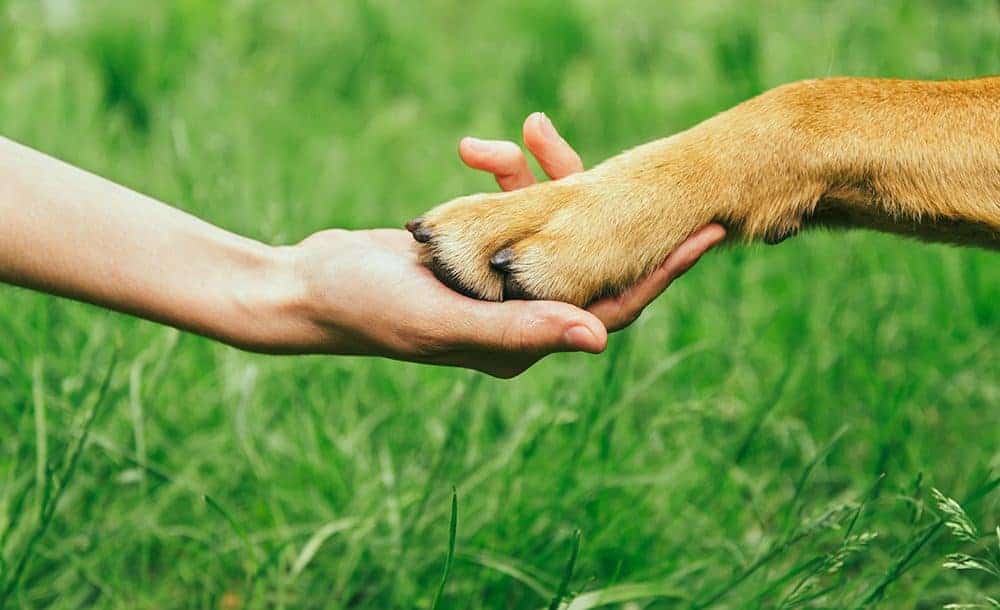
We all know that dogs are descended from wolves – wild animals who hunt in a pack with a leader. However, domestic dogs have evolved over thousands of years to develop a unique partnership with humans, which is very far removed from their ancient wolf ancestry.
Over millennia, the social interactions of dogs became less hierarchical, more fluid, less dependent on hunting in a pack and more focused on engaging with people to survive and flourish – essentially more of a social group than a pack. Therefore, it follows that a successful canine/human relationship should not be about the human being the pack leader, but about the two species forging a partnership together. Understanding this is key to having a rewarding relationship with your dog.
COMMUNICATION AND RESPECT
Of course, members of any social group need to cooperate and communicate, which requires rules and boundaries. The challenge for the human/canine relationship is communicating what we want while respecting what a dog needs. The human’s role is to teach a dog how to fit in with human society and what is acceptable and what is not – whether that’s something as simple as not jumping up or digging holes in the garden, or something more complex, such as not showing aggression towards strange dogs or people – which is often a dog’s honest opinion of a situation and how it makes them feel, expressed in the only way they know how.
This means both parties having to learn a great deal about each other and, rather than punishing or suppressing innate dog behaviours, a good owner uses positive reward training and play to direct those innate dog behaviours into safe, acceptable activities.
Dog trainer and presenter of It’s Me or the Dog Victoria Stilwell writes: “It is vitally important that you give your dog the opportunities and tools she needs to live successfully in your strange human world. The strongest relationships between dogs and humans are based on cooperation and kindness rather than on human dominance and animal submission. If you choose to use positive techniques when building a relationship with your dog, you will be on your way to establishing and maintaining a connection that increases trust and results in a stronger, healthier bond between you. Put simply, if your dog feels good about you, she will be happier, confident, better behaved, and more inclined to respond to you when you ask her to do something.”
GIVING CLEAR DIRECTION
Fortunately for dogs, they quickly learn what works to get things they want and need – whether that’s company, food, a game, security or attention – and will be naturally responsive to clear direction from their human. As well as showing us when they’re upset about something, the signs they are happy are easy for us to read – a wagging tail, a relaxed stance and a doggy smile. Achieving a balance between allowing dogs to tell us honestly what they think of situations, while getting them to understand how to behave appropriately is tricky. But, through understanding our dogs’ needs and constantly working on two-way communication, the good dog owner takes the role of senior partner in the team, rather than the pack leader.
A good dog owner...
- Gives dogs the opportunity to be dogs by letting them mooch about, enjoy plenty of sniffing time on their walks, have the freedom to run about, and to be sociable with other canines.
- Takes the time and trouble to teach dogs the boundaries that help them to be polite members of human society.
- Protects them from the things that upset them – not punish them for telling people if they are scared.
- Teaches dogs to cope with the difficult things in life, such as being handled, being left alone, being in strange situations or being treated by vets.
- Provides the opportunity to express innate dog behaviour through fun training, where this can be expressed in safe, fulfilling ways.
- Signs up to an up-to-date training class that understands how dogs learn and what they need. Find an Association of Pet Dog Trainers qualified dog trainer in your area
A good dog owner doesn’t...
- Intimidate or punish to get ‘obedient’ behaviour.
- Inflict unnecessary obedience or petty rules on their dog just so they can say they are ‘in charge’.
FIND OUT MORE about the rewards of praising your dog here
FIND OUT MORE about how to manage lead aggression here
FIND OUT MORE about caring for your dog here
Sources: positively.com, apdt.co.uk














